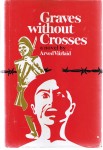Graves without Crosses by Arved Virrland (1972; Clarke, Irwin & Co. ISBN 0-7720-0525-7)
To my people. This simple dedication by Estonian literary giant, Arved Virrlaid, says it all. Graves is the novel to read before reading the recently released Purge, a contemporary novel covering much of the same geography (Tallinn and the surrounding Estonian countryside) while detailing a different political reality.
The author of nine novels and several collections of poetry, Viirlaid emigrated to Canada after fighting the Soviets in Finland and returning to his war-torn homeland. The book jacket tells us he lived some of the exploits used as background and setting for the novel. There’s no doubt, given the realism of the scenes Virrlaid brings to his depictions of the Estonian countryside, that this indeed is the case.
Graves takes place during the height of the Forest Brothers conflict after the second invasion of Estonia by Stalin in 1945 on the heels of the retreating Germans. The book centers upon Forest Brother Taavi Raudoja, the protagonist, and tells the tale of a tiny country caught between the competing interests of world powers. This powerfully written drama displays, in succinct prose, the abject despair that defeated Estonia and led to fifty years of Soviet domination.
Slow going at the outset, the book gains momentum as Taavi seeks to find his wife, newborn daughter, and eight year old son, who’ve been taken by the Soviet security apparatus and held in hopes of flushing Taavi from the forest. There is near constant sorrow, fear, and frustration to be had in this wonderfully written book. Chock full of memorable characters, action, heroes, and villains, Graves establishes Viirlaid as a master of Estonian culture and literature.5 stars out of 5.



